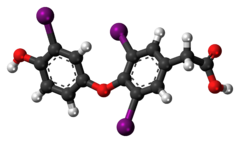Tiratricol
 | |
 | |
| Clinical data | |
|---|---|
| Other names | 3,3',5-triiodothyroacetic acid TRIAC |
| AHFS/Drugs.com | International Drug Names |
| Drug class | Thyroid hormone |
| ATC code | |
| Pharmacokinetic data | |
| Protein binding | Presumed high |
| Metabolism | Liver glucuronidation |
| Excretion | Bile duct |
| Identifiers | |
| |
| CAS Number | |
| PubChem CID | |
| IUPHAR/BPS | |
| DrugBank | |
| ChemSpider | |
| UNII | |
| KEGG | |
| ChEBI | |
| ChEMBL | |
| CompTox Dashboard (EPA) | |
| ECHA InfoCard | 100.000.079 |
| Chemical and physical data | |
| Formula | C14H9I3O4 |
| Molar mass | 621.935 g·mol−1 |
| 3D model (JSmol) | |
| |
| |
| | |
Tiratricol (also known as TRIAC or triiodothyroacetic acid) is a thyroid hormone analogue. Triiodothyroacetic acid is also a physiologic thyroid hormone that is present in the normal organism in low concentrations. Tiratricol is an analogue of a naturally circulating metabolite of the active thyroid hormone T3.[1] MCT8 is a specific thyroid hormone transporter.[1] While T3 and T4 thyroid hormones rely on MCT8 to enter several tissues such as the brain, tiratricol can enter cells independently of MCT8.[1] Once inside cells, tiratricol activates the thyroid hormone receptor in a similar way to endogenous T3.[1]
The most common side effects are excessive sweating, irritability, anxiety and nightmares.[1]
Medical uses
[edit]Tiratricol is indicated in the management of thyroid hormone resistance syndrome.[2]
Society and culture
[edit]Legal status
[edit]Tiratricol is not approved for sale in Canada or the United States. It was once an approved medication in Brazil, but its marketing authorization was suspended in 2003, effectively prohibiting its sale.[3] Tiratricol is available in France for therapy of thyroid hormone resistance and adjuvant therapy of thyroid cancer.[4]
In December 2024, the Committee for Medicinal Products for Human Use of the European Medicines Agency adopted a positive opinion, recommending the granting of a marketing authorization for the medicinal product Emcitate, intended for the treatment of MCT8 deficiency (Allan-Herndon-Dudley syndrome).[1][5] The applicant for this medicinal product is Rare Thyroid Therapeutics International AB.[1] Emcitate is a hybrid medicine of Téatrois, which has been authorized in France.[1] Emcitate contains the same active substance as Téatrois but has a different indication.[1]
Research
[edit]Tiratricol has been investigated for use in reducing goiter.[6]
It has also shown some effectiveness in reducing the atrophy caused when using corticosteroids.[7]
Tiratricol has also been widely marketed, under various trade names, as a weight loss aid. In 1999 and 2000, the United States Food and Drug Administration and Health Canada both issued warnings to the public regarding the use of dietary supplements containing tiratricol.[8][9]
References
[edit]- ^ a b c d e f g h i "Emcitate EPAR". European Medicines Agency (EMA). 12 December 2024. Retrieved 16 December 2024. Text was copied from this source which is copyright European Medicines Agency. Reproduction is authorized provided the source is acknowledged.
- ^ Carvalho GA, Ramos HE (2004). "[Thyroid hormone resistance syndrome]" (PDF). Arq Bras Endocrinol Metabol (in Portuguese). 48 (1): 83–92. doi:10.1590/S0004-27302004000100010. PMID 15611821.
- ^ "Anvisa suspende Tiratricol" (in Portuguese). Brazilian Society of Endocrinology and Metabolism. Archived from the original on 9 October 2007. Retrieved 8 August 2007.
- ^ Laboratoires DB PHARMA: Teatrois Archived 2015-01-19 at archive.today information
- ^ "First treatment for peripheral thyrotoxicosis in patients with Allan-Herndon-Dudley syndrome". European Medicines Agency (EMA) (Press release). 13 December 2024. Retrieved 16 December 2024.
- ^ Brenta G, Schnitman M, Fretes O, et al. (November 2003). "Comparative efficacy and side effects of the treatment of euthyroid goiter with levo-thyroxine or triiodothyroacetic acid". J. Clin. Endocrinol. Metab. 88 (11): 5287–92. doi:10.1210/jc.2003-030095. PMID 14602763.
- ^ Yazdanparast P, Carlsson B, Oikarinen A, Risteli J, Lavin T, Faergemann J (November 2006). "Action of topical thyroid hormone analogue, triiodothyroacetic acid in reversing glucocorticoid-induced skin atrophy in humans". Thyroid. 16 (11): 1157–62. doi:10.1089/thy.2006.16.1157. PMID 17123343.
- ^ "FDA Warns Against Consuming Dietary Supplements Containing Tiratricol" (Press release). U.S. Food and Drug Administration. 21 November 2000. Retrieved 8 August 2007.
- ^ "Health Canada issues warning on products containing Tiratricol (TRIAC)" (Press release). Health Canada. 2 December 1999. Retrieved 8 August 2007.
